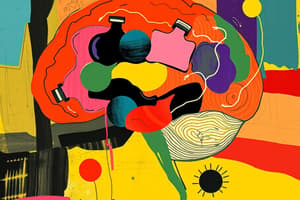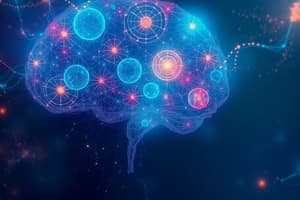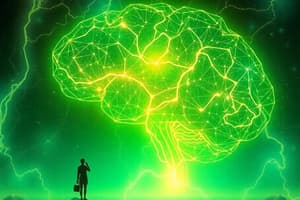Podcast
Questions and Answers
What is the primary focus of Industrial-Organizational Psychology?
What is the primary focus of Industrial-Organizational Psychology?
- Investigation of cultural differences
- Enhancement of athletic performance
- Application of psychological principles to the workplace (correct)
- Assessment of criminal behavior
Forensic Psychology primarily applies psychological principles in which setting?
Forensic Psychology primarily applies psychological principles in which setting?
- Legal and criminal justice settings (correct)
- Workplace environments
- Sports organizations
- Educational institutions
What aspect does Neuropsychology investigate?
What aspect does Neuropsychology investigate?
- Community well-being and social justice issues
- Consumer behavior and marketing strategy
- The relationship between brain functioning and behavior (correct)
- Leadership styles in organizations
What type of interference occurs when previously learned information disrupts new information retrieval?
What type of interference occurs when previously learned information disrupts new information retrieval?
Which branch of psychology focuses on student learning and mental health in schools?
Which branch of psychology focuses on student learning and mental health in schools?
What is the main goal of Community Psychology?
What is the main goal of Community Psychology?
What characterizes Alzheimer's disease?
What characterizes Alzheimer's disease?
Which area of psychology focuses on enhancing athletic performance?
Which area of psychology focuses on enhancing athletic performance?
What type of amnesia involves the inability to recall memories prior to its onset?
What type of amnesia involves the inability to recall memories prior to its onset?
Consumer Psychology studies which of the following?
Consumer Psychology studies which of the following?
What is a primary symptom of Alzheimer's disease?
What is a primary symptom of Alzheimer's disease?
The study of human strengths and resilience falls under which area of psychology?
The study of human strengths and resilience falls under which area of psychology?
Which cognitive process involves reasoning and problem-solving?
Which cognitive process involves reasoning and problem-solving?
Which of the following best describes Anterograde Amnesia?
Which of the following best describes Anterograde Amnesia?
What typically leads to cognitive decline in Alzheimer's disease?
What typically leads to cognitive decline in Alzheimer's disease?
Which cognitive functions may be affected as Alzheimer's disease progresses?
Which cognitive functions may be affected as Alzheimer's disease progresses?
What is psychological flexibility?
What is psychological flexibility?
What role does risk-taking play in creative thinking?
What role does risk-taking play in creative thinking?
What defines divergent thinking?
What defines divergent thinking?
How can limited resources affect creative thinking?
How can limited resources affect creative thinking?
What is essential for fostering a supportive environment for creative thinking?
What is essential for fostering a supportive environment for creative thinking?
What is the process of problem-solving?
What is the process of problem-solving?
What is the trial and error method in problem-solving?
What is the trial and error method in problem-solving?
What characterizes an algorithm in terms of problem-solving?
What characterizes an algorithm in terms of problem-solving?
What can lead individuals to withdraw from social interactions in their romantic relationships?
What can lead individuals to withdraw from social interactions in their romantic relationships?
How does learned helplessness affect a patient's response to their chronic illness?
How does learned helplessness affect a patient's response to their chronic illness?
What typically happens when individuals face persistent obstacles towards their goals?
What typically happens when individuals face persistent obstacles towards their goals?
What role does motivation play in an individual's behavior and goal pursuit?
What role does motivation play in an individual's behavior and goal pursuit?
What is intrinsic motivation?
What is intrinsic motivation?
What are the potential consequences of learned helplessness in the context of personal goals?
What are the potential consequences of learned helplessness in the context of personal goals?
Which type of motivation is related to internal satisfaction and personal fulfillment?
Which type of motivation is related to internal satisfaction and personal fulfillment?
What is a recommended approach to overcoming learned helplessness?
What is a recommended approach to overcoming learned helplessness?
What is defined as significant limitations in intellectual functioning that originate before the age of 18?
What is defined as significant limitations in intellectual functioning that originate before the age of 18?
Which of the following factors may contribute to the development of intellectual disability?
Which of the following factors may contribute to the development of intellectual disability?
What is typically an indicator of below-average intellectual functioning?
What is typically an indicator of below-average intellectual functioning?
Which of the following describes mental giftedness?
Which of the following describes mental giftedness?
Which characteristic is NOT commonly associated with gifted individuals?
Which characteristic is NOT commonly associated with gifted individuals?
Emotional intelligence encompasses which of the following abilities?
Emotional intelligence encompasses which of the following abilities?
What is a possible challenge faced by gifted individuals in traditional educational settings?
What is a possible challenge faced by gifted individuals in traditional educational settings?
What type of support may individuals with intellectual disabilities require?
What type of support may individuals with intellectual disabilities require?
What does Gardner's Theory of Multiple Intelligences suggest about intelligence?
What does Gardner's Theory of Multiple Intelligences suggest about intelligence?
Which type of intelligence is associated with language proficiency?
Which type of intelligence is associated with language proficiency?
What is a key characteristic of logical-mathematical intelligence?
What is a key characteristic of logical-mathematical intelligence?
Individuals with spatial intelligence are likely to excel in which of the following tasks?
Individuals with spatial intelligence are likely to excel in which of the following tasks?
Musical intelligence involves sensitivity to which of the following?
Musical intelligence involves sensitivity to which of the following?
Bodily-kinesthetic intelligence is best demonstrated by individuals excelling in which activities?
Bodily-kinesthetic intelligence is best demonstrated by individuals excelling in which activities?
Which aspect is NOT considered a key aspect of intelligence according to the content?
Which aspect is NOT considered a key aspect of intelligence according to the content?
How are the intelligences described in Gardner's theory characterized?
How are the intelligences described in Gardner's theory characterized?
Flashcards
I/O Psychology
I/O Psychology
Applying psychology to workplaces, focusing on employee motivation, leadership, organizational behavior, and job satisfaction.
Forensic Psychology
Forensic Psychology
Using psychology in legal and criminal settings, including assessments, treatments, and expert opinions.
Neuropsychology
Neuropsychology
Studying the link between brain function and behavior, cognition, and emotions, especially in neurological disorders.
Counseling Psychology
Counseling Psychology
Signup and view all the flashcards
School Psychology
School Psychology
Signup and view all the flashcards
Clinical Neuropsychology
Clinical Neuropsychology
Signup and view all the flashcards
Community Psychology
Community Psychology
Signup and view all the flashcards
Sports Psychology
Sports Psychology
Signup and view all the flashcards
Proactive Interference
Proactive Interference
Signup and view all the flashcards
Retroactive Interference
Retroactive Interference
Signup and view all the flashcards
Alzheimer's Disease
Alzheimer's Disease
Signup and view all the flashcards
Retrograde Amnesia
Retrograde Amnesia
Signup and view all the flashcards
Anterograde Amnesia
Anterograde Amnesia
Signup and view all the flashcards
Thinking
Thinking
Signup and view all the flashcards
Memory Dysfunction
Memory Dysfunction
Signup and view all the flashcards
Inhibition
Inhibition
Signup and view all the flashcards
Learned Helplessness
Learned Helplessness
Signup and view all the flashcards
Romantic Relationships (Learned Helplessness)
Romantic Relationships (Learned Helplessness)
Signup and view all the flashcards
Chronic Illness (Learned Helplessness)
Chronic Illness (Learned Helplessness)
Signup and view all the flashcards
Personal Goals (Learned Helplessness)
Personal Goals (Learned Helplessness)
Signup and view all the flashcards
Motivation
Motivation
Signup and view all the flashcards
Intrinsic Motivation
Intrinsic Motivation
Signup and view all the flashcards
Extrinsic Motivation
Extrinsic Motivation
Signup and view all the flashcards
School Learning Motivation
School Learning Motivation
Signup and view all the flashcards
Psychological Flexibility
Psychological Flexibility
Signup and view all the flashcards
Risk-taking in creativity
Risk-taking in creativity
Signup and view all the flashcards
Divergent Thinking
Divergent Thinking
Signup and view all the flashcards
Resources and Constraints
Resources and Constraints
Signup and view all the flashcards
Diversity as a Stimulant
Diversity as a Stimulant
Signup and view all the flashcards
Trial and Error
Trial and Error
Signup and view all the flashcards
Methods of Problem Solving
Methods of Problem Solving
Signup and view all the flashcards
Algorithm (problem-solving)
Algorithm (problem-solving)
Signup and view all the flashcards
Intelligence
Intelligence
Signup and view all the flashcards
Multiple Intelligences
Multiple Intelligences
Signup and view all the flashcards
Linguistic Intelligence
Linguistic Intelligence
Signup and view all the flashcards
Logical-Mathematical Intelligence
Logical-Mathematical Intelligence
Signup and view all the flashcards
Spatial Intelligence
Spatial Intelligence
Signup and view all the flashcards
Musical Intelligence
Musical Intelligence
Signup and view all the flashcards
Bodily-Kinesthetic Intelligence
Bodily-Kinesthetic Intelligence
Signup and view all the flashcards
Gardner's Theory
Gardner's Theory
Signup and view all the flashcards
Intellectual Disability
Intellectual Disability
Signup and view all the flashcards
Intellectual Functioning
Intellectual Functioning
Signup and view all the flashcards
Adaptive Behavior
Adaptive Behavior
Signup and view all the flashcards
Mental Giftedness
Mental Giftedness
Signup and view all the flashcards
Emotional Intelligence
Emotional Intelligence
Signup and view all the flashcards
IQ score
IQ score
Signup and view all the flashcards
High Intelligence
High Intelligence
Signup and view all the flashcards
Support & Interventions
Support & Interventions
Signup and view all the flashcards
Study Notes
Chapter 1: Introduction
- Psychology is the scientific study of behavior and mental processes.
- It encompasses the investigation of thoughts, feelings, perceptions, motives, emotions, and actions, along with biological and environmental influences.
- Psychology aims to understand, explain, predict, and improve human behavior and mental functioning across diverse contexts and populations.
Philosophical Roots of Psychology
- Ancient Greek philosophers (Plato, Aristotle, Socrates) laid the foundations for early psychological theories.
- Empiricism emphasized sensory experience and observation for knowledge acquisition.
- Rationalism highlighted the role of reason and logic in understanding thought and behavior.
Schools of Thought
- Structuralism (Wundt): Focused on analyzing basic elements of consciousness through introspection.
- Functionalism (James): Highlighted adaptive functions of consciousness and behavior.
- Gestalt Psychology (Wertheimer, Koffka, Kohler): Emphasized the perception and organization of sensory experiences as structured wholes rather than individual elements.
- Psychoanalysis (Freud): Stressed the role of unconscious mental processes, childhood experiences, and conflicts in shaping personality and behavior.
- Behaviorism (Watson, Skinner): Concentrated on observable behavior and the environmental factors influencing it, rejecting mental states.
- Humanistic Psychology (Rogers, Maslow): Emphasized the importance of subjective experience, personal growth, and self-actualization.
Goals of Psychology
- Understanding Behavior: Identify factors influencing behavior and how they interact to shape thoughts and feelings.
- Predicting Behavior: Develop theories and methods to predict future behavior.
- Controlling and Modifying Behavior: Develop effective interventions and strategies to change behavior.
- Promoting Mental Health and Well-being: Enhance mental health, resilience, and coping skills.
Research Areas
- Cognitive Psychology: Study of mental processes like memory and problem-solving.
- Developmental Psychology: Examination of physical, cognitive, and socioemotional development across the lifespan.
- Social Psychology: Investigation of social influences on behavior and attitudes.
- Clinical Psychology: Assessment, diagnosis, and treatment of psychological disorders.
- Health Psychology: Exploration of psychological factors affecting health, illness, and well-being.
- Educational Psychology: Advancement of learning processes and interventions.
- Industrial-Organizational (I/O) Psychology: Application of psychological principles to the workplace.
- Forensic Psychology: Application of psychology in legal settings.
- Neuropsychology: Investigation of the relationship between brain functioning and behavior.
Applied areas
- Counseling Psychology: Counseling services, psychotherapy and mental health to individuals, families, couples and groups.
- School Psychology: Services to support student learning, behavior and mental health, assessment, intervention and consultations.
- Clinical Neuropsychology: Assessment and treatment of brain injuries, neurological disorders and related cognitive impairments.
- Community Psychology: Community-based interventions and promoting community well-being, social justice and empowerment.
- Sports Psychology: Improving athletic performance, motivation, and mental skills.
- Environmental Psychology: Examination of the interplay between individuals and their physical environments.
- Consumer Psychology: Study of consumer behaviour, decision-making, and marketing.
- Military Psychology: Application of psychological principles to military settings.
Chapter 2: Human Development
- Human development encompasses biological, psychological, and social changes from conception to death.
- It is influenced by genetics, environment, culture, family, dynamics, education, and life experiences.
- Development is a dynamic and multidirectional process occurring across various domains (physical, cognitive, emotional, social, and moral domains).
- Baltes's principles of life-span development include multidirectionality, multidimensionality, plasticity, and historical embeddedness, and interindividual and intraindividual variability.
- Development unfolds across different stages: prenatal, infancy, childhood, adolescence, adulthood, and old age.
Major Perspectives in Psychology
- Behavioral Perspective: Emphasizes observable behaviors and environmental factors influencing them.
- Cognitive Perspective: Focuses on mental processes such as thinking, memory, perception, and problem-solving.
- Biological Perspective: Investigates biological basis of behavior, cognition, and emotions.
- Evolutionary Perspective: Explores how psychological traits and behaviors have evolved over time.
- Developmental Perspective: Examines human growth, development, and change throughout the lifespan.
- Psychodynamic Perspective: Emphasizes unconscious processes, inner conflicts, and early childhood experiences.
- Social and Cultural Perspective: Underscores the influence of social, cultural, and environmental factors on behavior.
Key Stages of Development
- Prenatal: Germinal, embryonic, and fetal stages, with rapid cell division and organ development.
- Infancy: Rapid physical, cognitive, emotional, and social changes; developing attachment and communication.
- Childhood: Refinement of motor skills, language, and social competencies; advances in cognitive abilities.
- Adolescence: Physical changes (puberty), cognitive and socioemotional development—identity exploration, peer relationships, and future planning.
- Adulthood: Early, middle, and late adulthood, characterized by different developmental tasks.
Chapter 3: Perception, Social Thought, and Behavior
- Perception: Process of interpreting sensory information from the environment.
- Factors influencing perception include the situation, the perceiver, and the target.
- Perceptual constancies (size, shape, color) involve maintaining stable perceptions despite changes in sensory input.
- Perceptual illusions are distortions in sensory information.
- Kelly's Attribution Theory explains how we attribute causes to people's behaviors.
- Impression formation and biases, including stereotypes, primacy effect, recency effect, halo effect, confirmation bias, and implicit bias.
Chapter 4: Learning
- Learning: Relatively permanent changes in behavior or mental processes due to practice, experience, observation or instruction.
- Learning can occur through: classical conditioning, operant conditioning, cognitive learning, observational learning and insight learning.
- Classical Conditioning: Associative learning where a neutral stimulus becomes associated with a meaningful stimulus to elicit a response.
- Operant Conditioning: Learning through consequences—reinforcement increases behavior; punishment decreases behavior.
- Observational Learning: Learning by observing and imitating others.
- Insight Learning: Solving problems through sudden understanding rather than trial and error.
Chapter 5: Motivation and Emotion
- Motivation: Driving force behind behavior, energized, directed, and sustained toward achieving goals. Motivation can be intrinsic (internal) or extrinsic (external).
- Emotion: Complex state of feeling that results in physical and psychological changes influencing behavior--Can be positive or negative.
- Types of emotion include primary emotions (happiness, sadness, anger, fear, surprise, disgust_) and secondary/complex emotions (love, jealousy, guilt, shame, hope, gratitude, empathy.
- Social aspects of motivation and emotion, such as how emotions can impact social behaviour.
Other Chapters (Based on the provided titles)
- Further chapters cover topics including memory and forgetting; cognition (including aspects like mental images, concepts, creative thinking, problem-solving); decision-making; human intelligence (including various theories and approaches such as Gardner's Multiple Intelligences, Cattell's theory of intelligence, Sternberg's triarchic theory, Goleman's dimensions of emotional intelligence); and variations in intellectual ability (such as intellectual disability and mental giftedness).
Studying That Suits You
Use AI to generate personalized quizzes and flashcards to suit your learning preferences.




